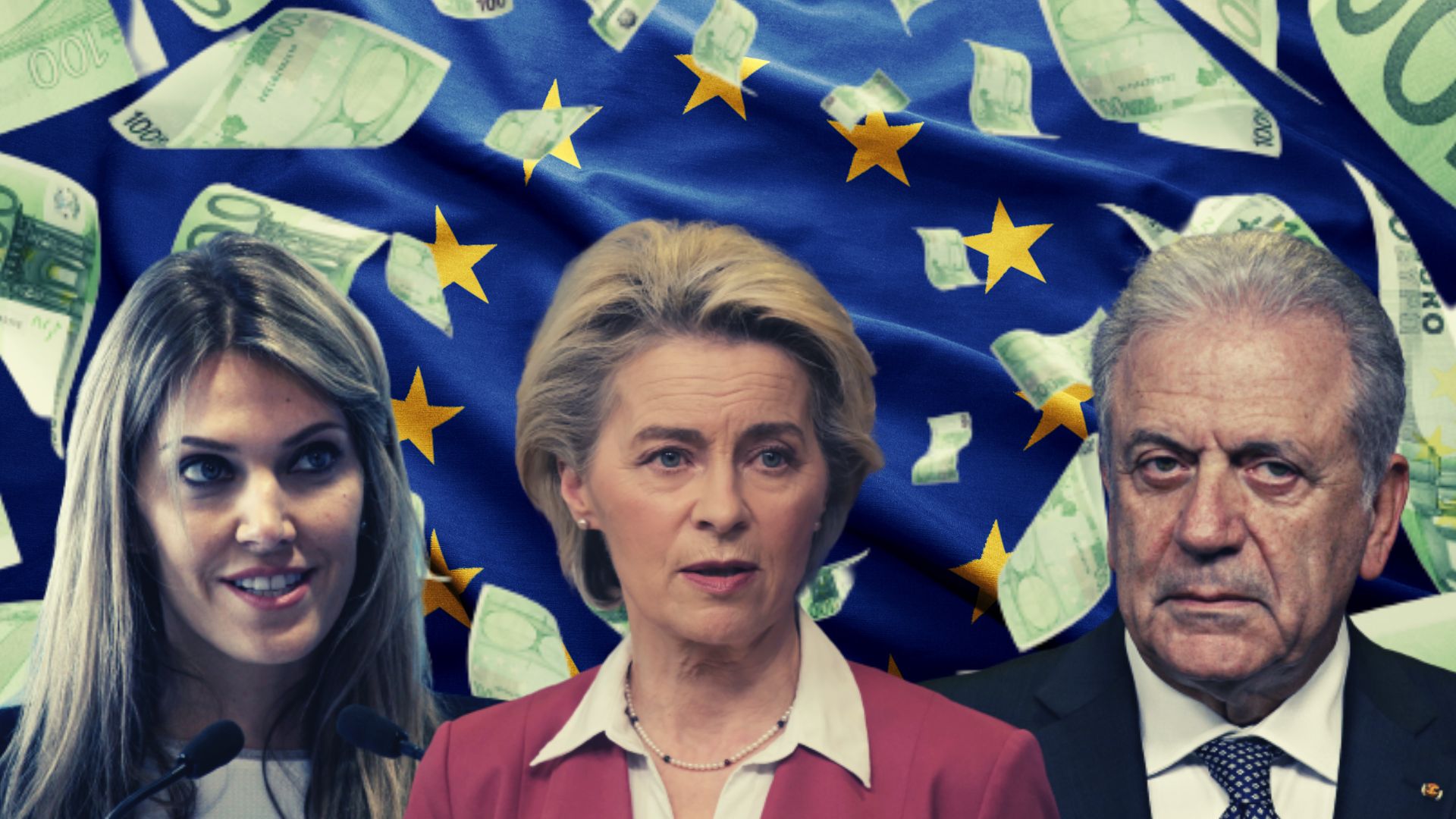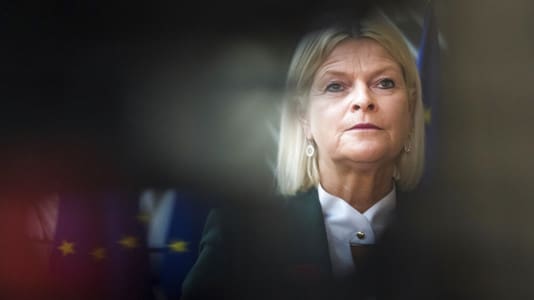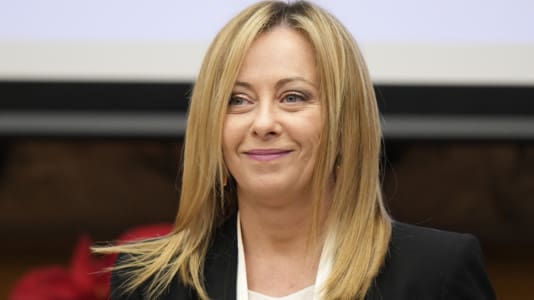There are signs that the Qatargate bribery investigation which has rocked the European Parliament is now spreading to the European Commission, and depending on who ends up ensnared in the scandal, the investigation’s results could be catastrophic for the liberal-left ruling Brussels.
Suddenly, MEPs, shadowy NGOs, and various left-wing networks are facing much of the scrutiny they are totally unaccustomed to, including former EU commissioner Dimitris Avramopoulos.
In February 2017, Avramopoulos insisted that the EU-27 would need 6 million more immigrants in the coming years and that the EU would open immigration offices in all countries on the southern coast of the Mediterranean and in western Africa as a way to fight illegal immigration.
Avramopoulos, who made the remarks during an event at the University of Geneva, was not just any commissioner at the time he called for 6 million more migrants to Europe, but the commissioner in charge of immigration, which means he had a powerful voice regarding the direction the EU took on the divisive issue.
This same former commissioner is now being eyed for his potential role in the EU’s latest scandal, which has seen at least €1.5 million in bribe money from Qatar and Morocco found in suitcases and paper bags of left-wing EU officials, including Greek MEP Eva Kaili, who was formerly a European Parliament’s vice-president and who is now awaiting trial.
In light of the ongoing corruption scandal, there are also serious concerns that Avramopoulos may have had a monetary motive to lobby for 6 million migrants into Europe.
One of the two countries that allegedly sponsored this corruption scheme is a known state sponsor of Islamism and a declared strategy of Islamists to impose their creed on Europe is to encourage mass emigration of Muslims to Europe. At the same time, given all that Avramopoulos said, wrote and did when he was the European Commissioner for Migration, Home Affairs and Citizenship in the Juncker Commission, there is speculation that Qatar and other state sponsors of Islamism have long been exerting their influence by corrupting members of EU institutions.
According to information released to the public, Avramopoulos had been appointed to the “Honorary Board” of Fight Impunity, the NGO founded by former MEP Pier Antonio Panzeri, from Italy, who is at the center of the corruption scandal. It is also clear that Avramopoulos had obtained the current commission’s green light for this appointment and that he met several times as a Fight Impunity board member with incumbent commissioners before the end of the two-year period was over in which he was supposed to have been banned from participating in meetings for political talks or lobbying.
An internal inquiry has now been opened into the former commissioner’s meetings as a board member of Fight Impunity, the NGO at the center of the “Qatargate” bribery scandal, where he allegedly met with at least nine members of the Von der Leyen commission.
[pp id=60412]
Although Avramopoulos was a member of the center-right New Democracy party, which has governed Greece under Prime Minister Kyriakos Mitsotakis since 2019 with a tougher approach to immigration, Avramopoulos remains a strong advocate of mass immigration to Europe.
His call for 6 million migrants into Europe sounded very much like the Soros Plan often denounced by Hungarian Prime Minister Viktor Orbán. Avramopoulos conceded at the time that “we cannot, however, let everyone in,” as it “would only feed xenophobia, nationalism, and populism,” but later, in December 2017, Avramopoulos published an article to explain to his fellow Europeans that illegal “migrants are here to stay,” that “we cannot and will never be able to stop migration,” and that we should therefore “collectively change our way of thinking.”
In the new Von der Leyen Commission, Avramopoulos’ responsibilities are now shared between his fellow Greek and party colleague Margaritis Schinas, Commission Vice-President and Commissioner for Promoting our European Way of Life, in charge of the integration of immigrants, culture, and sport, and Sweden’s socialist Ylva Johansson, Commissioner for Home Affairs in charge of immigration and asylum.
[pp id=60026]
An internal inquiry has now been opened into the former commissioner’s meetings with at least nine members of the current Von der Leyen commission. According to the European Commission’s own internal rules, when a commissioner’s mandate comes to an end, the said commissioner is not allowed to have any contacts of a political nature or for lobbying with incumbent commissioners.
Avramopoulos’ tenure in the Juncker Commission ended in November 2019 and, as a member of Panzeri’s Honorary Board at Fight Impunity, he should have refrained from meeting with active European commissioners at least until the end of November 2021.
However, as was disclosed by the Italian newspaper La Stampa just before Christmas, Avramopoulos met in that forbidden period at least with his fellow countryman Margaritis Schinas, with the other commissioner in charge of immigration issues Ylva Johannson, and with commission vice-presidents Frans Timmermans (who was in charge of rule-of-law issues in the Juncker Commission and is now in charge of the EU’s fight against global warming), Margrethe Vestager, Maros Sefcovic (in charge of interinstitutional relations), and Vera Jourova (in charge of “values” and “transparency”), as well as with commissioners Mariya Gabriel, Stella Kyriakidou, and Johannes Hahn, the commissioner for budget and administration who was in charge of proposing drastic cuts to Hungary’s EU funding over Brussels’ supposed concerns about democratic standards, corruption, LGBT rights and migration issues under Viktor Orbán’s governments.
[pp id=59694]
Needless to say, the members of the Von der Leyen Commission whom Avramopoulos met were also supposed to refrain from meeting with Avramopoulos in the two-year period following the end of his tenure in the Juncker Commission.
To make things worse, Fight Impunity, where Avramopoulos served as a member on its honorary board, was not registered in the EU transparency register despite the lobbying activities it was engaged in, and this should have been one more reason for EU incumbent commissioners not to meet with Avramopoulos, even after the end of the said two-year period.
As one can read on the European Commission’s own website, “the transparency register is a database that lists organizations that try to influence the law-making and policy implementation process of the EU institutions. The register makes visible what interests are being pursued, by whom, and with what budgets. In this way, the register allows for public scrutiny, giving citizens and other interest groups the possibility to track the activities of lobbyists. (…) Meetings relating to policy-making and implementation in the EU can only take place if the interest representatives are registered in the EU transparency register.”
[pp id=59555]
The meetings between Avramopoulos and current members of the European Commission, which the latter now says were of a “private” nature, have only come to light because of an internal investigation launched by Ursula von der Leyen on Dec. 21 after the information about Avramopoulos’ role in the NGO at the core of the “Qatargate” scandal was publicized.
Avramopoulos himself has said that he was paid €60,000 for his position in the Fight Impunity NGO, but claims he did not conduct any lobbying activity and that his role was “without executive or management responsibilities”. Although the former European commissioner was the only honorary board member to be remunerated with €5,000 per month before tax, his role, by his own admission, was limited to promoting the NGO.
“My participation in the Fight Impunity organization was from the beginning without executive or managerial responsibilities. The committee I attended — with personalities such as [former High Representative of the European Union for Foreign Affairs and Security Policy] Federica Mogherini, former French premier Bernard Cazeneuve and Senator Emma Bonino, among others — was entirely honorary. For my participation and the accompanying fee, I sought the approval of the European Commission and it was given to me in writing by President von der Leyen,” Avramopoulos said in a statement.
[pp id=58946]
In Italy, the prosecutor’s office has seized €240,000 from the bank accounts of Pier Antonio Panzeri at the request of the Belgian judiciary. This amount adds up to the €600,000 in cash seized by Belgian investigators in Panzeri’s home in Brussels as part of the €1.5 million found in total during the police raids executed on Dec. 9 that led to the arrest of former MEP Pier Antonio Panzeri, incumbent Vice-President of the European Parliament Eva Kaili, Kaili’s partner and S&D parliamentary assistant Francesco Giorgi, as well as several other people linked to the S&D Group in the European Parliament.
Panzeri’s NGO Fight Impunity was also raided by the Belgian police on that day and it is being investigated for its central role in the corruption scheme allegedly financed by Qatar and Morocco.
Back in 2018, Hungary had formally asked European Commission President Jean-Claude Juncker to remove Dimitris Avramopoulos from his office after years of conflicts with Budapest fueled by the Greek commissioner over the issue of illegal immigration.
Today, Avramopoulos says in his defense that the allegations against him as a board member of Panzeri’s NGO are an Italian plot to get him out of the competition for the role of EU Special Representative for relations with Gulf countries, a position Italy’s former Foreign Minister Luigi di Maio is also eyeing.
[pp id=9405]
“The Hungarian conservative side is following the Qatargate scandal with keen interest because of the irony of the situation,” one could read on the government-funded English-language news website Hungary Today on Dec. 22, “as the European Commission is demanding stricter rules from the Hungarian government against corruption, supposedly because the Hungarian government has repeatedly spoken out in recent years about the dubious role of NGOs in EU politics.”
With Poland similarly engaged in a row over the European Commission’s withholding of tens of billions of euros in NextGenerationEU funds because of declared concerns about rule-of-law issues, no doubt the authorities in Warsaw are also observing the unfolding scandal with great interest, and no doubt it will add to the Poles’ growing disgust with the European Parliament and Commission.
Patriotic conservatives across Europe have already pointed to the corruption scandal as a glaring sign of rot and backroom dealing apparent in Brussels, but as the scandal spreads, it may mark a turning point in the history of how Brussels is perceived by the general public.
“Being corrupted by Qatar, the hub and nerve center of the Muslim Brotherhood, is high treason,” said Nicolas Bay, the French MEP who was behind a report (written in French) by the Identity & Democracy Group in the European Parliament on the Muslim Brotherhood’s presence in Europe.
Nicolas Bay was initially referring to the current and former S&D MEPs and parliamentary assistants who are accused of accepting bribes from Qatar and Morocco, but further investigations by the Belgian authorities have now shown that the European Commission is most probably involved to some extent in this “Qatargate” corruption scandal.
One element of the case is clear: the MEPs currently caught in the scandal also lobbied for reduced visa restrictions on Qatar, allowing Qataris visa-free travel into Europe, showing the direct connection between immigration and lobbying efforts from Middle Eastern countries. The bribe money may have also been flowing for years, and even with the best efforts of Belgian investigators, they may never know the true extent of corruption in the EU’s most powerful institutions.






